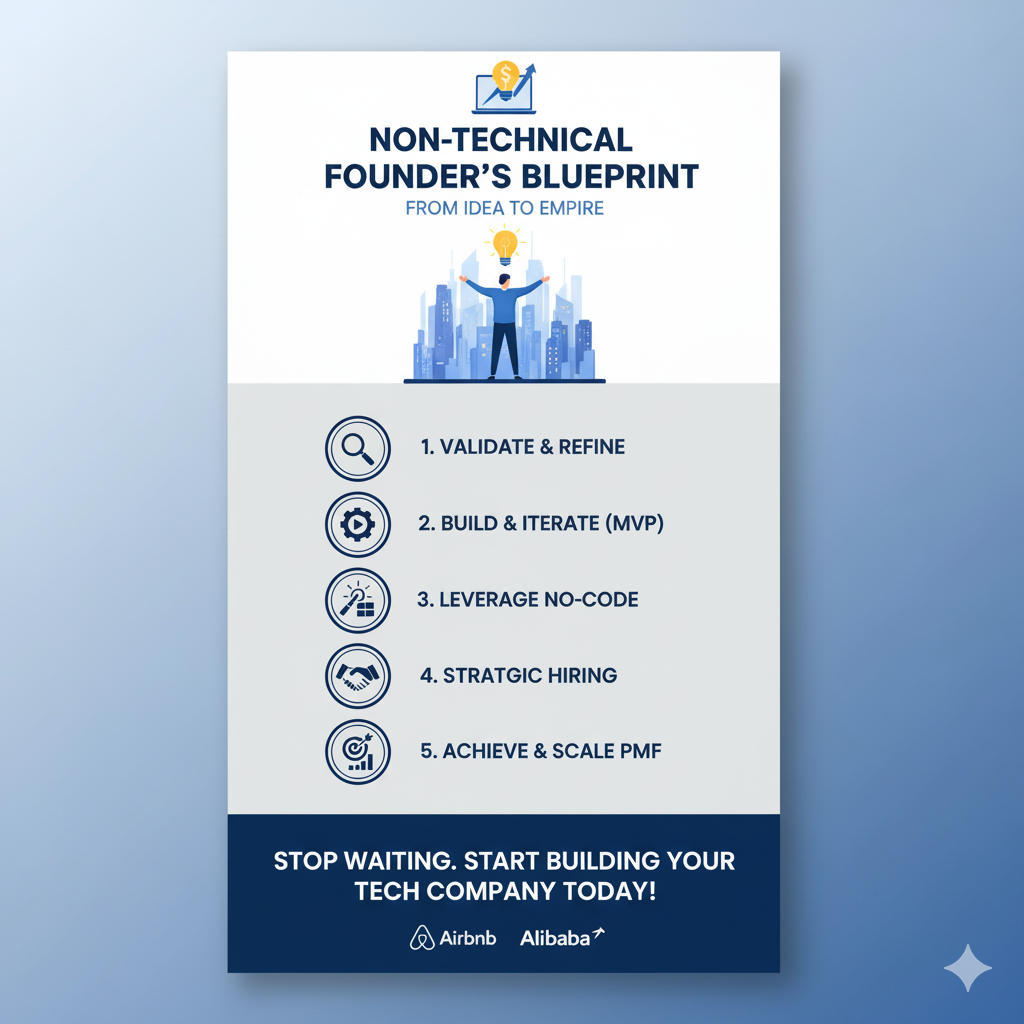
The myth of the perfect founding team often dictates that a tech startup must have a technical co-founder from day one.
This belief, while rooted in the reality of building complex software, has stalled countless brilliant ideas from non-technical visionaries.
You have the market insight, the business acumen, and the passion, but you lack the coding skills.
Does this mean your dream is dead?
Absolutely not.
In fact, some of the world’s most successful tech companies were founded by non-technical leaders who simply refused to wait for a technical partner [2].
This comprehensive guide is your blueprint for successfully navigating the journey of building a tech startup without a technical co-founder, transforming your perceived weakness into a strategic advantage.
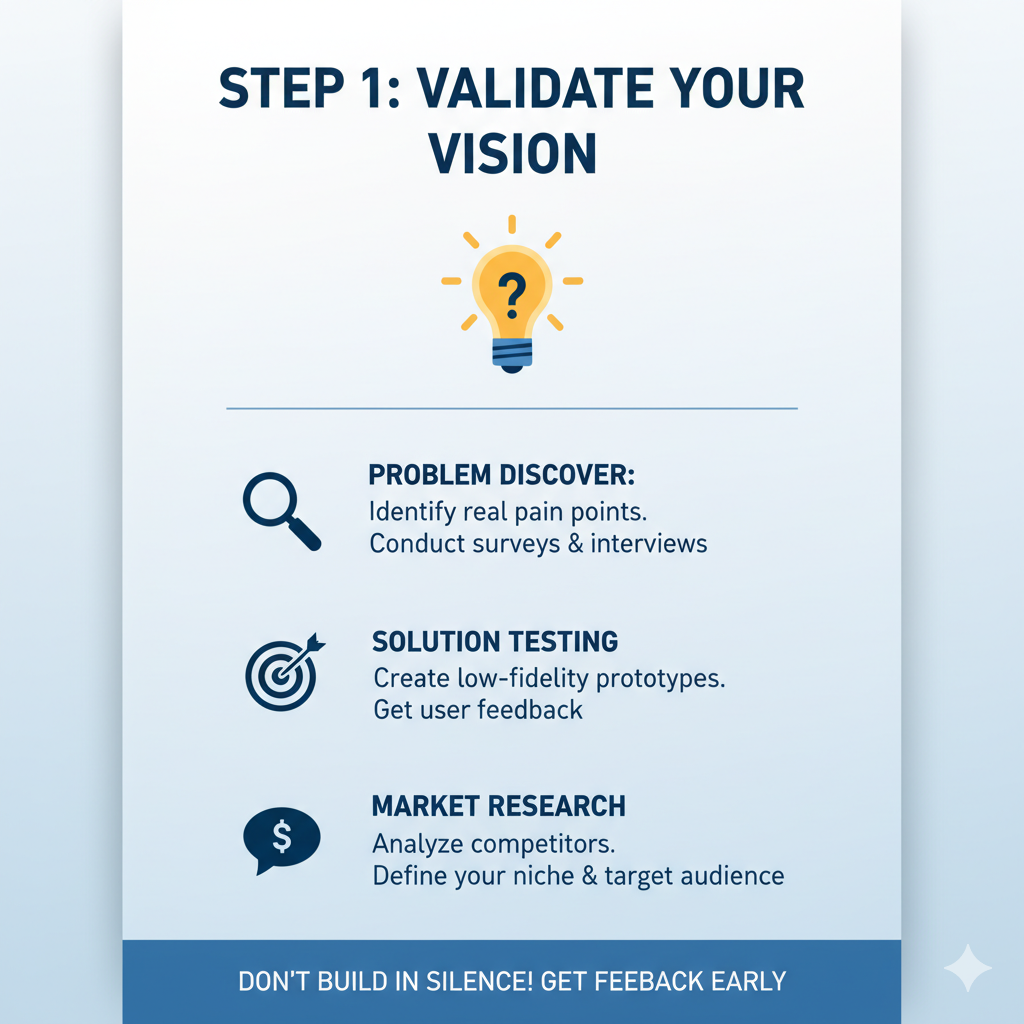
Phase I: The Non-Technical Founder’s True Superpower: Validation and Vision
Before writing a single line of code, your most critical responsibility as a non-technical founder is to achieve product-market fit [10].
Your lack of technical expertise forces you to focus intensely on the problem, the customer, and the market—areas where many technical founders often fall short, prematurely optimizing code instead of validating demand.
This is your superpower.
Mastering the Problem Space
A technical co-founder’s primary role is to build the product; your primary role is to ensure that product is worth building.
This means becoming the world’s leading expert on your customer’s pain point.
Spend months, not weeks, talking to potential users, understanding their workflows, and documenting the exact nature of the problem you are solving [7].
This deep immersion allows you to define the Minimum Viable Product (MVP) with surgical precision, which is crucial for minimizing the initial development cost and risk.
The clearer your vision, the less ambiguity you present to future developers, which directly translates to faster, cheaper, and more accurate execution.
The Power of the Pre-Technical MVP
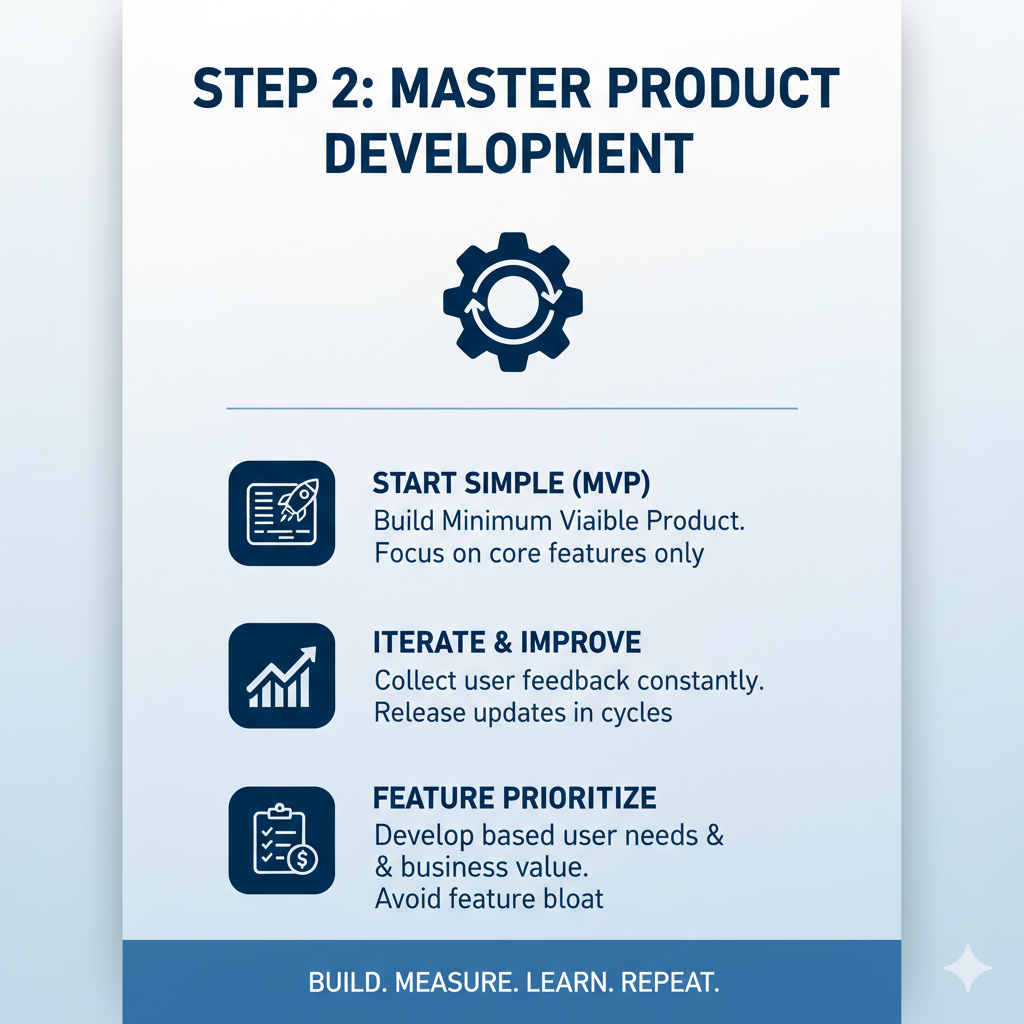
The MVP doesn’t have to be software.
A non-technical founder can and should build a “pre-technical” MVP to test demand and gather feedback.
This can take many forms: a simple landing page to collect emails, a PDF prototype, a spreadsheet-driven service, or even a concierge service where you manually perform the function the software will eventually automate.
For example, the founders of Airbnb initially validated their idea by manually renting out air mattresses in their apartment [2].
This approach proves market demand without requiring a significant technical investment, giving you leverage when you eventually seek funding or a technical partner.
Phase II: Strategic Product Development Without Code
The landscape of software development has dramatically shifted in favor of the non-technical founder.
The rise of no-code and low-code platforms offers a powerful bridge between your vision and a functional product.
Leveraging No-Code and Low-Code Tools
Before you consider hiring, explore tools that allow you to build a functional prototype or even a fully operational MVP without writing a single line of code [9].
Platforms like Bubble, Webflow, Adalo, and Zapier can handle complex logic, database management, and user interfaces.
This strategy allows you to launch faster, iterate based on real user data, and retain complete control over the product’s early direction.
It also serves as an invaluable communication tool, providing a tangible product for potential investors or co-founders to evaluate.
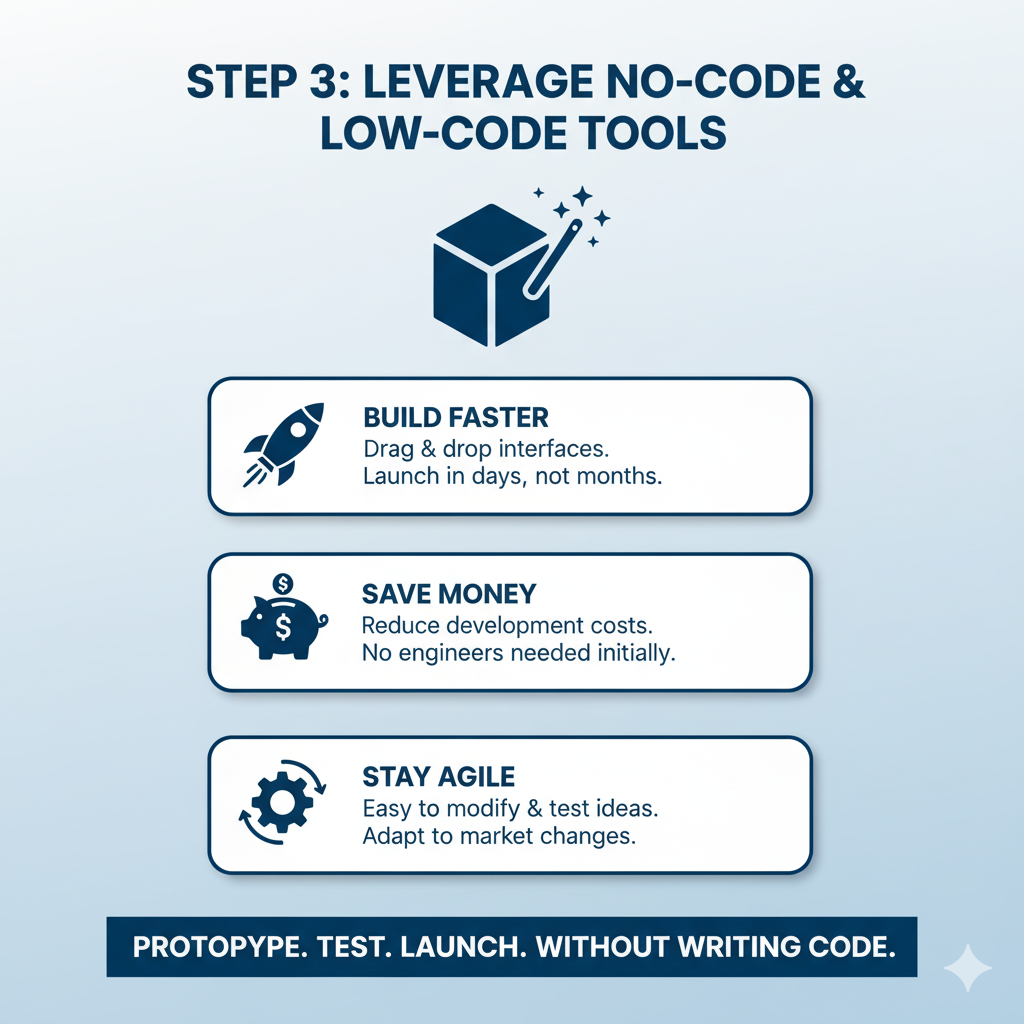
| No-Code Tool Category | Example Platforms | Non-Technical Advantage |
|---|---|---|
| Web Apps & Databases | Bubble, Adalo, Retool | Build complex, logic-driven applications and manage user data without SQL. |
| Website & CMS | Webflow, Squarespace | Create professional, responsive, and SEO-friendly marketing sites and blogs. |
| Automation & Integration | Zapier, Integromat (Make) | Connect different services to automate workflows and simulate backend processes. |
| Mobile Apps | Glide, AppGyver | Quickly turn spreadsheets or databases into native-feeling mobile applications. |
By using these tools, you are not avoiding technology; you are simply outsourcing the initial, commoditized parts of the technology stack to highly efficient platforms.
The Importance of Technical Literacy
While you don’t need to code, you must become technically literate.
This means understanding fundamental concepts: how APIs work, the difference between front-end and back-end, basic database structure, and the software development lifecycle.
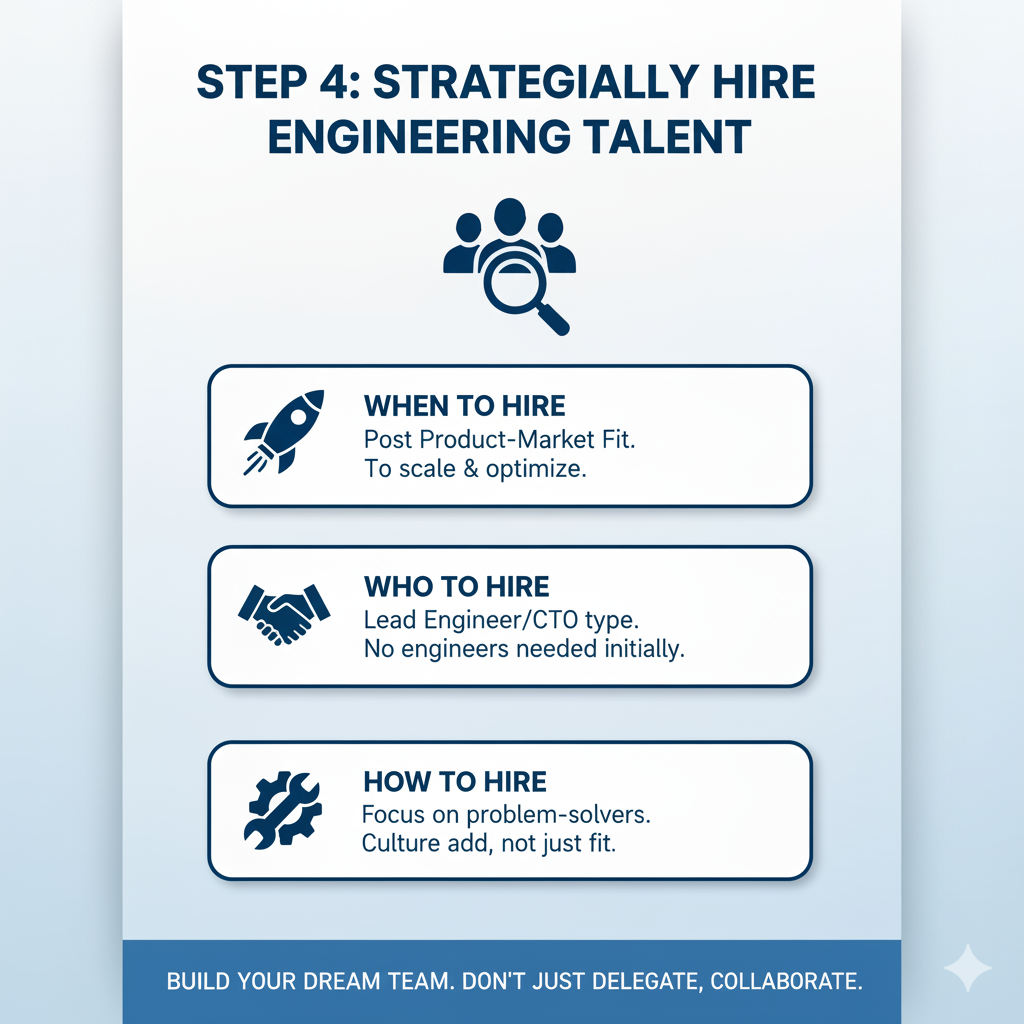
This literacy is essential for scoping projects, evaluating developer proposals, and communicating effectively with your future technical hires or partners [15].
A non-technical founder who speaks the language of technology (even without writing it) commands respect and avoids being taken advantage of.
Phase III: The Strategic Hire: Finding Your First Engineer
Eventually, your no-code solution will hit a wall of complexity, or you will need custom, proprietary technology to maintain a competitive edge.
This is the moment to transition from a solo founder to a team builder.
Co-founder vs. First Hire
Many non-technical founders waste time searching for a mythical “technical co-founder” who will work for free on an unproven idea.
A better strategy is to focus on hiring your first engineer—a talented, senior developer who can serve as a technical lead and eventually grow into a CTO role [14].
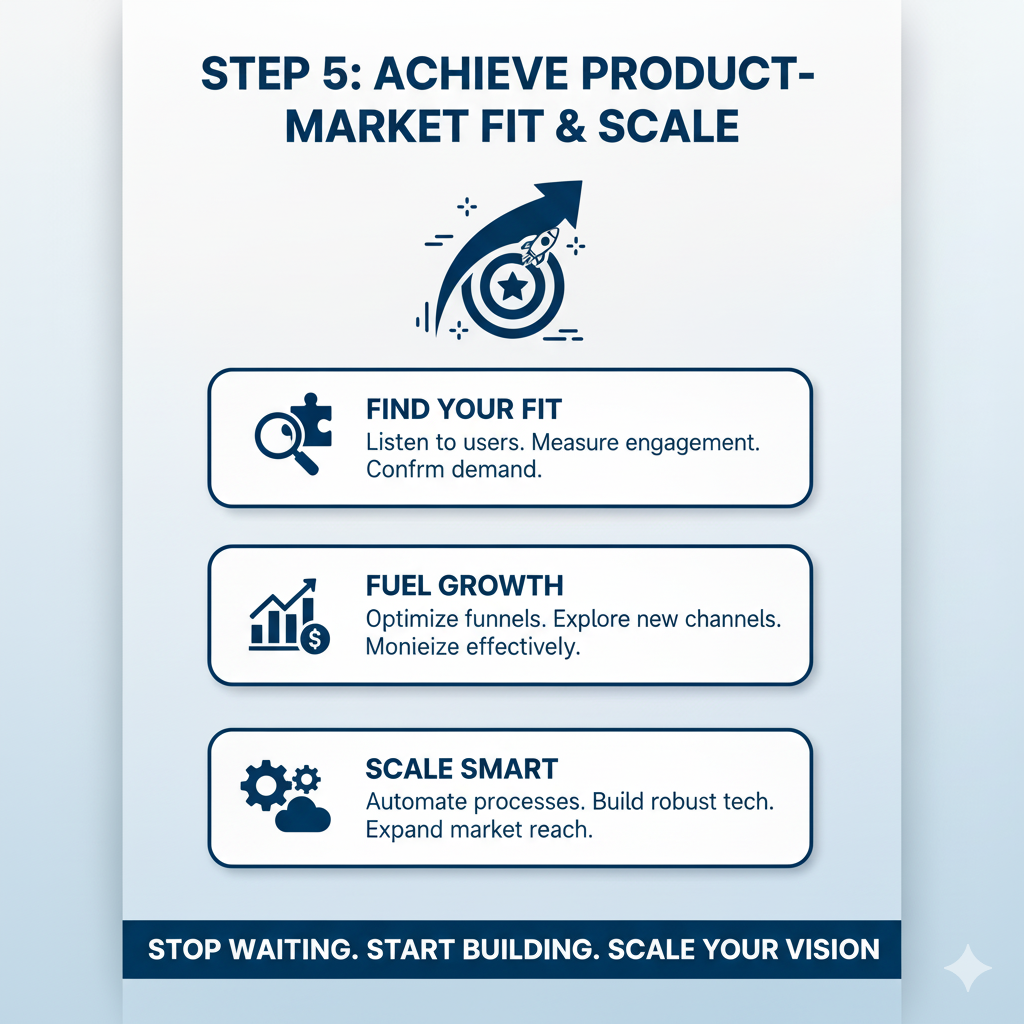
By the time you hire, you will have a validated idea, a functional MVP, and paying customers (or at least strong user metrics), which makes your company a much more attractive proposition.
This approach shifts the relationship from an equal-risk partnership to an employer-employee dynamic, giving you more control and clarity on roles.
Where to Find and How to Evaluate Talent
Finding the right technical talent requires a targeted approach [6].
Look for senior developers who have experience in startups, understand the full product lifecycle, and are excited by the business problem, not just the technical challenge.
When evaluating candidates, focus on their ability to solve problems and communicate, rather than their ability to pass a complex coding test that you can’t evaluate.
Key Evaluation Questions for Non-Technical Founders:
Ask them to walk you through a past project that failed and how they handled the technical debt.
Ask them to explain a complex technical concept in simple, non-technical terms.
Ask them how they would prioritize a list of features, half of which are business-critical and half of which are technical debt [15].
Their answers will reveal their product sense and communication skills, which are far more important than raw coding speed in an early-stage hire.
Consider a short, paid contract project to evaluate their work ethic and fit before committing to a full-time role.
Phase IV: Managing the Technical Roadmap and Risk
Once you have a technical team, your role shifts to managing the technical roadmap and serving as the bridge between the customer and the code.
This requires a disciplined approach to project management and a clear understanding of technical debt.
Scoping and Documentation
The single greatest risk for a non-technical founder is poorly defined scope, which leads to ballooning costs and endless development cycles [15].
You must become a master of documentation.
Every feature, every user story, and every bug fix must be documented with crystal clarity, including mockups, acceptance criteria, and the business reason for its existence.
Tools like Figma for design, and Jira or Trello for project management, become your best friends.
Never give a developer a vague instruction like “make the site better” or “improve the user experience.”
Instead, provide a specific, testable instruction: “When a user clicks the ‘Add to Cart’ button, the item count in the top-right corner should increase by one.”
Controlling Technical Debt
Technical debt is the cost of choosing an easy, fast solution now over a better, more robust solution later.
As a non-technical founder, you must understand that technical debt is not inherently bad; it is a strategic choice.
In the early stages, rapid iteration and speed to market often justify incurring some debt.
However, you must work with your technical lead to regularly allocate time—perhaps 20% of every sprint—to pay down the most critical debt.
Ignoring it will eventually slow down development to a crawl, making your product unmaintainable and your technical team miserable.
Case Studies in Non-Technical Success
The history of technology is littered with examples of non-technical founders who built empires.
These stories prove that vision and execution trump coding ability in the early stages of a startup.
| Company | Non-Technical Founder | Technical Strategy |
|---|---|---|
| Airbnb | Brian Chesky & Joe Gebbia | Initially used a concierge MVP (renting air mattresses) and outsourced early development before finding a technical co-founder. |
| Alibaba | Jack Ma | Focused intensely on the business model and market needs in China, relying on hired developers to execute the vision. |
| Groupon | Andrew Mason | Started with a simple WordPress blog and manually generated PDF coupons, proving the demand before building the complex platform. |
| BuzzFeed | Jonah Peretti | Focused on viral content and distribution strategy, with technology serving as a tool for scale rather than the core innovation. |
These founders excelled because they focused on the core business problem: the customer, the market, and the revenue model.
They treated technology as a necessary tool, not a prerequisite for starting.
Conclusion: Your Role is the CEO, Not the CTO
The journey of a non-technical founder building a tech startup is challenging, but profoundly rewarding.
Your lack of coding experience is not a fatal flaw; it is a forcing function that compels you to be a better CEO, a better product manager, and a better communicator.
You are the one who defines the why and the what; the technical team is responsible for the how.
Stop waiting for the mythical technical co-founder to validate your idea.
Start with intense validation, leverage the power of no-code tools, and strategically hire the right technical talent when your business metrics demand it.
The time to build is now.
References
[1] Advice for Non-technical Founders – i will not promote. https://www.reddit.com/r/startups/comments/1l7azhy/advice_for_nontechnical_founders_i_will_not/
[2] From Idea to Launch: How to Build a Tech Startup Without a Technical Cofounder. https://www.netsolutions.com/insights/how-to-build-a-tech-startup-as-a-non-technical-founder/
[3] Why Every Startup Needs a Technical Cofounder. https://www.coffeespace.com/blog-post/why-every-startup-needs-technical-cofounder
[4] How I found my co-founder by building first. https://www.linkedin.com/posts/alexlee611_most-non-technical-founders-think-they-activity-7308140241851162626-Ufkw
[5] Top 10 Tech Startups Founded by Non-Tech Founders. https://www.codeventures.com/blog/top-10-tech-startups-founded-by-non-tech-founders/
[6] Non-technical founders — how do you find a co-founder?. https://www.instagram.com/reel/DHhcIdjPk7T/
[7] What do non technical founders do during the product development?. https://www.reddit.com/r/startups/comments/1hxxg3k/what_do_non_technical_founders_do_during_the/
[8] Non-technical founders can build successful tech companies. https://www.linkedin.com/posts/itselanagold_only-technical-founders-can-build-successful-activity-7362548389403611136-BQsJ
[9] Non-Tech Founder’s Checklist: Essential Steps to Launch Your MVP. https://altersquare.medium.com/non-tech-founders-checklist-essential-steps-to-launch-your-mvp-041fd6cb35c5
[10] From MVP to Success 3 Keys to Building a Tech Startup as a Non-Tech Founder. https://www.codementor.io/blog/keys-to-build-successful-startup-non-tech-founder-1nh7mhhyht
[11] How to launch a startup as a non-tech founder. https://www.linkedin.com/posts/nataliekaminski_if-i-were-launching-a-startup-today-as-a-activity-7355951541830262788-7R7g
[12] As a non-technical founder, where do you find your first developer?. https://www.reddit.com/r/startups/comments/1lkp5p7/as_a_nontechnical_founder_where_do_you_find_your/
[13] Non-technical founder hiring your first (maybe only) dev?. https://www.linkedin.com/pulse/non-technical-founder-hiring-your-first-maybe-only-dev-t-guthrie-beezc
[14] How Non-Technical Founders Can Hire Their First Engineer. https://www.linkedin.com/pulse/how-non-technical-founders-can-hire-first-engineer-yashar-moradi-mglrf
[15] Struggling For Tech Direction? 10 Things Non-Technical Founders Should Know Before Hiring. https://www.shawnmayzes.com/articles/struggling-for-tech-direction-10-things-non-technical-founders-should-know-before-hiring/
